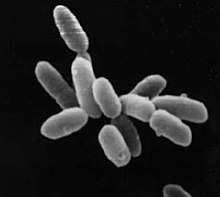
Back عتائق عريضة Arabic عتائق عريضه ARZ Euryarchaeota BS Euriarqueots Catalan Euryarchaeota Czech Euryarchaeota German Eŭriarĥeoto Esperanto Euryarchaeota Spanish Euryarchaeota Estonian پهنباستانیان Persian
| Euryarchaeota | |
|---|---|

| |
| Halobacterium sp. strain NRC-1, each cell about 5 µm in length. | |
| Scientific classification | |
| Domain: | Archaea |
| Kingdom: | Euryarchaeota Woese, Kandler & Wheelis, 1990[1] |
| Phyla[2] | |
| Synonyms | |
| |
Euryarchaeota (from Ancient Greek εὐρύς eurús, "broad, wide") is a kingdom of archaea.[3] Euryarchaeota are highly diverse and include methanogens, which produce methane and are often found in intestines; halobacteria, which survive extreme concentrations of salt; and some extremely thermophilic aerobes and anaerobes, which generally live at temperatures between 41 and 122 °C. They are separated from the other archaeans based mainly on rRNA sequences and their unique DNA polymerase.[4] The only validly published name for this group under the Prokaryotic Code is Methanobacteriati.[5]
- ^ Woese CR, Kandler O, Wheelis ML (June 1990). "Towards a natural system of organisms: proposal for the domains Archaea, Bacteria, and Eucarya". Proceedings of the National Academy of Sciences of the United States of America. 87 (12): 4576–9. Bibcode:1990PNAS...87.4576W. doi:10.1073/pnas.87.12.4576. PMC 54159. PMID 2112744.
- ^ Castelle CJ, Banfield JF (2018). "Major New Microbial Groups Expand Diversity and Alter our Understanding of the Tree of Life". Cell. 172 (6): 1181–1197. doi:10.1016/j.cell.2018.02.016. PMID 29522741.
- ^ Hogan CM (2010). E. Monosson, C. Cleveland (eds.). "Archaea". Encyclopedia of Earth. National Council for Science and the Environment. Retrieved 18 August 2017.
- ^ Lincoln SA, Wai B, Eppley JM, Church MJ, Summons RE, DeLong EF (July 2014). "Planktonic Euryarchaeota are a significant source of archaeal tetraether lipids in the ocean". Proceedings of the National Academy of Sciences of the United States of America. 111 (27): 9858–63. Bibcode:2014PNAS..111.9858L. doi:10.1073/pnas.1409439111. PMC 4103328. PMID 24946804.
- ^ Cite error: The named reference
gokerwas invoked but never defined (see the help page).